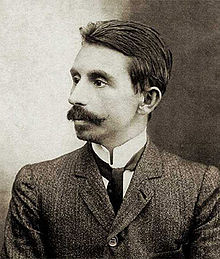You can help expand this article with text translated from the corresponding article in Portuguese. (November 2018) Click [show] for important translation instructions.
|
Euclides da Cunha | |
|---|---|
 | |
| Born | January 20, 1866 Cantagalo, Rio de Janeiro, Empire of Brazil |
| Died | August 15, 1909 (aged 43) Piedade, Rio de Janeiro |
| Occupation | Journalist Sociologist Engineer |
| Nationality | Brazilian |
| Genre | Poetry |
| Signature | |
Euclides da Cunha[1] (Portuguese: [ewˈklidʒiʒ dɐ ˈkũɲɐ], January 20, 1866 – August 15, 1909) was a Brazilian journalist, sociologist and engineer. His most important work is Os Sertões (Rebellion in the Backlands), a non-fictional account of the military expeditions promoted by the Brazilian government against the rebellious village of Canudos, known as the War of Canudos.
This book was a favorite of Robert Lowell, who ranked it above Tolstoy. Jorge Luis Borges also commented on it in his short story "Three Versions of Judas". The book was translated into English by Samuel Putnam and published by the University of Chicago Press in 1944. It remains in print. He was heavily influenced by Naturalism and its Darwinian proponents. Os Sertões characterised the coast of Brazil as a chain of civilisations while the interior remained more primitive. He occupied the 7th chair of the Brazilian Academy of Letters from 1903 until his death in 1909.
He served as inspiration for the character of The Journalist in Mario Vargas Llosa's The War of the End of the World.
- ^ Archaic spelling: Euclydes